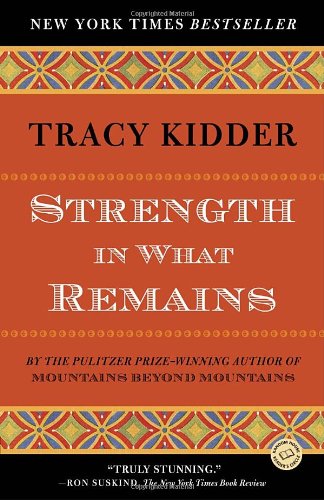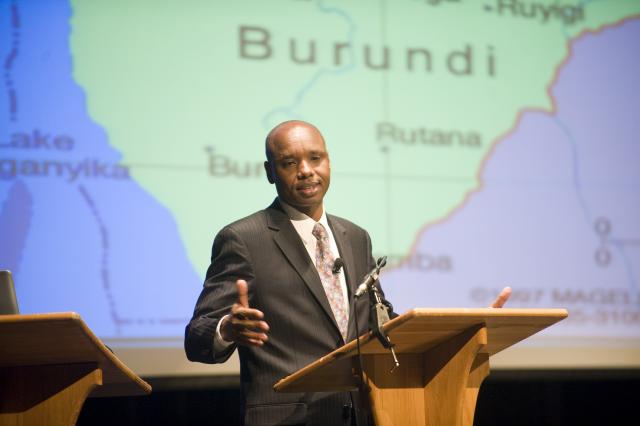
I stumbled across this book at “Book Reviews” in Bluffton. I was browsing through the “Mennonite literature” section when the woman working approached me to tell me that the books in the boxes on the floor were all 50 cents. I thanked her absentmindedly, assuming that these were not a particularly high-quality selection. As I was leaving the store, however, I glanced down and saw this book by Tracy Kidder.
Each year at EMU, I made a point to read the Campus Common Read. Last year, it was “Mountains Beyond Mountains” by the same author. The book ended up being hugely influential on my life aspirations, inspiring me to consider careers in public health or even long-term service.
Tracing the life of a man named Paul Farmer, “Mountains Beyond Moutains” outlines the development of the organization called Partners in Health (PIH) that combats multiple-drug resistant tuberculosis and AIDS in underdeveloped countries such as Haiti. Farmer split his time between pursuing his MD/public health duel degree and serving as a physician in Haiti. PIH is big on creating a “preferential option for the poor”, reminiscent of the Catholic social teaching. I had not previously been exposed to this concept, but it stuck with me long after turning the last page.
As Americans, we are willing to spend ANYTHING on our own family’s healthcare, even going so far as to artificially extend “life” past irreversible brain death. Even poor Americans have access to a wealth of health care services; no one can legally be turned away because they are unable to pay. While reading this book, however, I realized with horror that I had been operating under the assumption that my life was somehow more valuable than the life of a rural Haitian. It doesn’t matter whether or not we would admit this–our actions speak for themselves. We go through life assuming that there is no feasible solution to public health crises in third-world countries, thereby giving ourselves permission to sit back and do nothing.
Now of course, I’m not suggesting that we should live in a constant state of guilt, but Paul Farmer stands out because he was brave enough to reject this complicity. He dedicated his life to advocate for the poor. He held unconventional views, but he worked within the system by proving the economic feasibility of his method of public health and articulating his vision clearly to potential benefactors. In this way, PIH was able to gain momentum and make a real difference.
“Learn to do good; seek justice, correct oppression; bring justice to the fatherless, plead the widow’s cause.” -Isaiah 1:17
Paul Farmer lived with intention. I want to learn to do the same. I don’t know how Paul Farmer feels about this particular passage of Isaiah, but I imagine that he takes it seriously. What greater calling can there be in life?
I am grateful to have found “Strength in What Remains”, which served as a timely reminder to all that had been on my mind after reading Kidder’s other book. It is a work of nonfiction, following the life of Deo, a Tutsi man who escapes the from the civil war-torn country of Burundi, just South of Rwanda.

He arrives in NYC with nothing but $200 and the clothes on his back. Although he was a medical student in Burundi, he spoke no English and had no connections in the United States. Through a fortuitous chain of events, he is lifted out of homelessness and poverty by the kindness of strangers and accepted into Columbia University. After completing a medical degree in the United States, this impressive man heads back home to complete his lifelong dream of starting a clinic in Burundi.

In this time of rejection of refugees, I needed to hear the hope in this refugee’s story. However, it also serves as a warning to how easily well-meaning people can be radicalized by groupthink, as occurred between the Hutu’s and the Tutsi’s in Rwanda and the surrounding countries in the past few decades. We tend to think of ISIS, the KKK, and the Nazi’s as horrific, isolated groups… but I think it is important to remember that the majority of those who were complicit in these movements were ordinary people.
It has scared me to see the fanaticism of Trump supporters this year. The man himself declared, “I could stand in the middle of 5th avenue and shoot somebody and I wouldn’t lose voters.” The problem doesn’t lie in the fact that he said these words; the problem is that he’s right.
Ethnic violence may feel removed from our times, but as Deo laments, “I have learned never to say, ‘never again’.”
This book renewed my commitment to think critically about “business as usual”: to, like Paul Farmer, think and vote and act with intention, not with the crowd. Deo was energized by encountering and creating consuming, life-giving work that he truly believed in. I hope to find the same in these coming years.


Wonderful book! Wonderful review/reflection!
If you liked this, I would recommend Pathologies of Power by Paul Farmer. A heavier read, but well worth a skimming, if not a closer reading. Like you, Farmer transformed my way of thinking about health in the global south, especially in Haiti and Cuba.